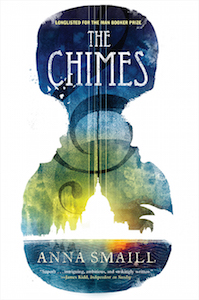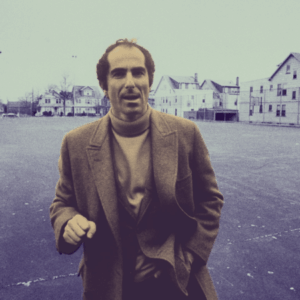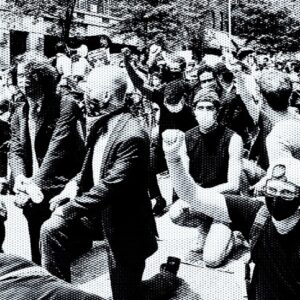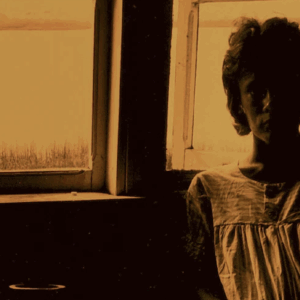Burberry
I’ve been standing here forever. My arms and legs and head and even my bones are heavy with sleep. Clothes heavy with the rain that won’t stop falling. Shoes heavy with mud. My roughcloth bag is slung over my shoulder and it jostles against my leg as I shift from side to side to keep warm. It’s heavy too, weighted with objectmemories. The ones I’ve decided to take.
Deep in the drilled-in mud of the fields behind me, our bulbs are wrapped in their brittle skins with their messages of color stored inside. Blue iris, yellow crocus, tulips of all colors. I won’t be here to see them open. Longcup, double trompet. Daffs with the flowers in papery bunches and their smell of pepper like the air as it is just before Chimes.
Along the horizon, the fields are lines of gray that get darker as they reach the sky. I stare at them hard to make a picture I can take, but it’s only objectmemories you can trust in the end. And I’m carrying those in the bag already. You can’t force them to flower either. Like bulbs, they show their secrets in their own time.
****
A trader rides past. A handful of farmworkers cross the fields to the neighboring farm. A swagman sings the there-and-back of his day’s journey, a song whose cadence closes at our village square. All journeymen, lighting their way through near distance with a day’s tune. Most people won’t venture farther than a day—tarry longer from home, and the memories kept there, and risk losing the melody back.
At last a horse and cart come to a stop. “Whoa,” says the carter and the horse blows steam. The cart is covered in a big tarp, and the carter sits up front and says nothing, just jerks his head to show “get up.” He waits there while the horse stamps.
When I’m sat in the back with the wool bales, he takes an old burberry from his shoulders and passes it. I’m wet through. I gather the burberry over my shoulders, and to save speech I sign the solfege for “thank you.” He shrugs to say it’s nothing. Then he shrugs two more times, not from choice, I realize, but because his muscles are dancing. I look away from that. The stink of woolfat is strong and I bury my nose in the sleeves of the burberry.
“How far are you headed?” he asks.
“Into the city,” I say. “Or close as you’re bound.”
“You going in to be prentissed?”
I shake my head. “I’m going in to trade.”
He studies my farmclothes and my single roughcloth bag and is tacet awhile. “And a ride back?” he says. “You’ll be looking for one, I suppose?”
I meet his look and there’s nothing in my eyes. I don’t need a ride back. I have a name and a song to find, a thread to follow. But it’s not something to share. With my gaze I dare him to ask again, but he turns to the front and hitches the reins. We go forward and the cart’s bumping goes through me.
“I’m bound for Leadenhall. I can set you down where you want. But take my advice and get prentissed soon as you can. Instrument makers are always on the lookout for young fingers.” He flexes his own hands, cracks his knuckles. His head jerks rough again on his neck. “Don’t wait too long,” he says.
I keep my eyes fixed on the road ahead.
Around one toll after Sext we set down in Romford, where the carter buys lunch of cheese, bread, dried blood sausages. He spears one, passes it to me. I eat presto, like I don’t remember my last meal. Then we are back on the A-road, straight as a viol string stretched under the sky. The farther we go, the wider the road and the thicker the knots of people. And with each step closer the city’s music grows.
At first it’s just the shouts and calls of song from traders. Then there are driving bursts of melody from highboy, viol, clarionet. We trot in past blankfaced buildings with hollow windows and buckled mettle and narrow cobbled streets. Music spills from the living quarters above shops, spins up from groups of musicians standing in door frames. Trompets send out brassy martial calls along the roof turrets. Viols speak with voices high and yearning and full of ache like human song. And under it all is the hard horsehoof beat of tambors. It grows and grows in a vast crescendo.
The carter looks at me with my mouth hanging open. I am gobsmacked. My face is up and ears peeled in what? Joy? Amazement? I know I have been to London for trade before. I had forgotten this.
The whole city is talking in music.
We move through the crowded streets. I turn side to side as if I could hear it all, but the melodies move presto and the meanings slip past. At home those four notes strung together mean one thing, but here the tune’s words play a kind of trick on the meaning, pull against the notes so it says something else altogether.
After a while my ear begins to hold the tunes in my head long enough to unpick them. The official conversations are loudest—roll calls for choir and orkestra rehearsals, poliss warnings, the announcement of a funeral mass. Below those are striding public conversations—calls for new prentisses, invites to buy food or beer. Then threading through narrow and low are the in-between melodies. The songs people sing piano to their loved ones, calling to their minds the good things of home and reminding them of the streets to take to get there. A woman’s voice makes me lift my head. It’s a song for a child, a simple lilted lullaby, and the sweetness of it hits me hard and for a while I can’t move. I see the carter look at me again as I sit there with my face raised and eyes wet, and I shrug the burberry up, turn away.
And that’s when I hear something else. Deep under the soundfabric of the city, somewhere to the south—a voice of silver announcing itself. Like a hole of silence down there, a rip in the hubbub. I do not understand what it means. And voice is not the right word, either, as voice is sound. What I hear is the absence of sound, its opposite. The carter does not remark it, though, so I do not ask.
It’s long past None when the horse pulls to a halt and the carter turns to say he’s going into the small streets now to visit his daughter before market tomorrow and do I want to get down? In where he points the houses grow close together. Their roofs are red tile. I nod. But I am tacet.
“Remember. Find a prentisship,” he says. “Don’t wait too long.”
When I go to give him back the burberry, he shakes his head. “Keep it,” he says. He sketches the formal solfege for “farewell” in the air as well. “And keep your memories close.”
I hear the common phrase for what it is: a warning.
****
Alone with my bag of memories and the burberry, I move through the crowds of traders and prentisses. On the street’s north side, I pass an enormous white crosshouse with its crushed mettle dome open like a mouth to the sky. I repeat the two things I have to hold to, the ones my mother gave me. A name and a humdrum, homely melody. A stranger’s name—Netty. A melody that has in it the sound of food cooking, water bubbling.
Shops and people, trades and secrets. A tune for all of them. A special price today for blue linen. Best-quality clarionet reeds. Tarp hoods for rain. Pennywhistles. Oranges. And all I’ve got is the name and the song. No placename, nothing with directions in it. And no idea how I’m meant to find one solo melody in the midst of all this din.
So I do the only thing I can think of. I follow my stomach.
Bar of Chocolate
The first street I pass carries the waft and song of peanuts cooked in caramel and sausages on a grill. I keep down the same wide road and pass bakers singing yeasted bread. Hot coffee. Beer. Nothing close to my mother’s tune, though.
Then a short, busy street to my right and at its end a broad, high-arched building where the smells gather, rich and thick and heavy. The sounds of a market place are familiar even if the accent and the tunes are strange.
I walk through broken pillars and down steps and find a corner to watch and count my tokens inside the vast market square. My stomach is turned with loneliness and strangeness. The people move around me and I am invisible to them. But I sniff; I listen.
A plaintive three-note cry from a sweet-potato man who sings as he pedals a bellow wheel. A tune of golden meat pasties sung by a fat woman with a wink. There are tunes for sandwiches and for potatoes fried in goosefat, and there is a seabrimmed song sung by a boy with dark hair and a shucking knife. A song with a gleam of pearl in it for the oysters he sells. The oysters are from Essex, the song says. Like me.
And then the homely note of one tune weaves its way out of the rest. There is something in it that catches and tugs. A solo voice singing, though it’s not a tune so much as a quick underbreath patter to match the rhythm of boiling water and hissing butter.
Four beats down is the small vending cart, its blue tarp awning just wide enough to cover a tiny bench with a three-ring sterno plate and two beaten-mettle stools. Behind the stove, there’s a woman with grayflecked dark hair caught into a bun. She is wearing an apron and moves presto between two huge pots and a small cast-iron skillet. The pots simmer and she croons to them, “Bubble and squeak, neeps and tatties.”
In my mind the voice is joined and doubled by another voice: my mother’s. The tune is the one she gave me.
My throat aches with relief, right up under my ears.
“Netty?”
I try to keep the hope out of my voice. I try to keep out the questions I want to ask.
When she looks up, she does so lento, as if she’d known I would be standing there. A flicker in the brindled eyes.
“Netty,” I say again.
She silences me with a tssk of breath. “Sit down,” she says, sharp. And before I can say more, she places a plate of hash in front of me.
The food silences me better than her warning. While it’s in front of me, I eat like I can’t remember my last meal.
While I eat, the woman called Netty clears up her stall. She tidies a pile of gold-wrapped bars into a neat stack. Wipes down the bench and the stove. Picks up a steelo and starts to scour the skillet. All the while her head is bent and her movements are clipped tight. At last she walks past the bench and looks presto both ways before she pulls the furled tarp down, closing us off from the rest of the market. The late-afternoon light comes through the tarp and makes everything a pale blue color, old and sad.
She looks at me then. Though her gaze is steady, I see that she is afraid.
“What do you want?”
“My mother gave me your name,” I say. “She sang me your tradesong. I’ve come all the way from our farm in Essex.” This time I fail to keep out the note of desperation.
“Keep your voice down, boy,” she says. A presto look to the tarp. Then she returns to scouring. “There’s no one left in Essex,” she says. There is a sour pleasure in her voice and for a second I see the people massed in our village hall for Chimes. Her words make no sense.
“You don’t understand,” I say. “My mother told me to find you. She meant you to help me.”
Netty sighs and lowers her chin, looks me hard in the eye.
“Who is your mother, then, when she’s at home?”
“Her name was Sarah Wythern.”
She says nothing, but she is listening.
“What else did she tell you?” she asks.
I try to remember. I search through the last few days of grief and strangeness and I come up empty. My mind is closed tight so there’s nothing in it but the rain on the road and the bumping of the cart and the hubbub of the city. A low dread rises up in me.
“Nothing.”
“Then she must have given you something. Something to prove who you are?”
I shake my head.
She hisses under her breath, like the sound of potatoes in fat. “A song? No other message?”
“No,” I say. “Only your tradesong.”
Netty is silent awhile. Her face is blank and closed, as if whatever was once warm in her has gone cold long ago.
“Every fool and his prentiss knows my tradesong, boy. I can’t help you if you have no proof.”
At first I am unsure of what she is telling me. Then she speaks again. “I don’t know anyone called Sarah Wythern,” she says. “There’s no place for you here.”
I shake my head against what she says and fix my eyes on the bench, stand still as if she might yet change her mind. I have nowhere else to go. In front of me is the pile of gold-wrapped bars, each purple paper band embossed with the same jingle. I hear again the flat, refusing note in her voice like a door shutting. And as if it doesn’t belong to me, my hand moves out toward the bars and I take one, weigh it in my hand, hear the tune on the paper that is sweet and rich. There is something else in her voice too, I think: she is lying.
“That wasn’t a question,” Netty says with no flinch in her eyes. “Take your memories and get the hell out of my stall.”
****
I leave the market by the opera house, shouldering through the crowds to get free. My heart beats like a tambor under my ribs, tight and loud with anger. In one hand I hold the bar of chocolate I snatched from Netty’s stall.
The crowds follow their own paths through the streets, pushing and pulling around me, paying no mind. Only the prentisses watch as I pass, step back to leave an exaggerated berth. Scorn on their shut-in faces. From an open window a man half screeches a tune and all at once the noise is too much. Too many stories speaking tutti, too many melodies demanding notice. I stop there in the middle of the street, as if I could stand solo and be the one still point of the noise and dance.
Then someone shoves past me and my feet slip and I’m flat out on the cobbles. My memory bag across the ground and out of my grasp and all subito the other voices seem to stop as if silenced by some high-raised baton. I leap forward. I stretch out full to grab back the bag from under the tramping feet. Down on the ground, people’s legs move above as if I am not there. A voice curses and there’s a sharp kick to my hipbone, but my hands grip roughcloth and I pull the bag to my chest and kneel there with it cradled like a baby.
After, I stand under the eave of a building, out of the surge of the crowd. My breath comes in short bursts like the carter’s horse. I wind the leather straps of the bag around my hand and wait for the horror to lift. How long would it take if I lost them? How long before you’re one of the nameless, wandering ones? Clustered for comfort with the rest of them, like a sheep on the public green: memorylost.
Bodymemory would keep you going awhile. After all, muscles and bones have their own trick of remembering what to do each day. The habits go right down, deep in there with your breath and blood. My body remembers the shape of fields, though, the right weather for planting, the feel of the earth. My arms know how to turn a seedbed; my hands the depth a bulb will thrive at. And that’s no use here. Only objectmemories can tell me who I am. That’s where you keep the pictures of what happened, stored in scraps and oddments salvaged from passing days. When I hold them, the objects, the pictures come up. My whole life is in my bag. Bits of my childhood. Pieces of the last days on the farm. Everything I ever thought important enough to keep. I fight the urge to reach down right now and touch one, let the pictures cluster and pull me down.
She was right, Netty. There is no place for me here. No place, and the thread I followed my way in on hangs loose already. My mother not two days dead and I have failed her. The city slips outward around me in its awful din and its smell of bilge and rosin.
Then I hear it again.
That whisper of silence somewhere in the south. A cool current through the clutch and noise. It comes like the promise of a place I can draw breath.
I use my hands to carve through the crowds and through the melodies. I take corners as they come, moving blind. Past boarded buildings and vendors and more people. Across a broad street with grand buildings. Through duos and trios of musicians, their instruments flashing silver, maple, gold. Down a narrow gray alley, into a park, two spiked fences vaulted, a push through the scrub and at last, over a wide concrete road, there it is.
A river like a clear, flat highway. A river wider than I’ve ever seen. Graybrown water. The boats like toys on it and the ripples pushing through as it runs east to west. Calm, like it’s been there forever and seen everything.
My arms shake as I look, like I’ve just put down something that was much too heavy. This is where I’m standing when I hear the sky’s half-cough half-shiver. The warning so deep in bodymemory that my muscles are the first to answer. I have lost track of the tolls and it is a narrow minute from Vespers—and Chimes.
At Matins the Carillon sounds Onestory piano—quiet, amabile. Onestory is antiphony: question and answer, call and response. Our voices fill in the melody gifted by the Carillon. We give the right answers, always the same and the same for all. If life is music, as it is, Onestory is the bass. Which is to say the burden, the constant truth beneath everything. There to walk on and also to steer with, each and every morning.
At Vespers, though, Chimes is another thing altogether. Solo and forte, strong enough to bring you to your knees, put you in your place. Different every time, and always changing.
Across the road is a stone platform guarded by two strange catlike creatures made of black stone. One has its face broken clean off. The other still wears its whole smile, calm and pretty as a girl. A glance at the catgirl but no time to make a better acquaintance as I slip beside her and through the twisted mettle bars that keep me from the water. I crouch tight at the top of the stairs that walk down into the water’s mouth. The best I can do is empty my mind as the air pulls in and out like a tide, like a set of lungs, and the smell of pepper comes.
****
Chimes is like a fist. It unclutches, opens. Starts like a fist, but then it bursts like a flowering. Who can say if it’s very slow or very fast? Chimes is always different, and even after the thousands of times, I couldn’t venture to say what it’s like.
On the south side, people have come out of buildings and houses to form a ragged line along the bank. They stretch up one by one into the great calm of the music. My arms stretch up too, kin with the joints and muscles of those distant strangers.
It’s the melody simple first. We follow in solfege. Hands in concert as the sky is carved by it: Soh Fah Me Doh Ray Me Soh Fah Me Me Ray Doh Doh Soh Soh. Then the melody is repeated, but turned upside down. Then it comes again, but up an octave and another voice takes the inverted melody and they weave together. The chords wash over. They clean and center me. The weight of the tonic goes down my spine and into the ground.
Follow the melody through its variations, through its opening and flowering. It tells of harmony and beauty. It tells of a beauty wider than any of us. My mind opens with it and everything there is in the world is shown in perfect order in the music. There is no space for any other thought.
The sides of the river unfold. The forward and backward of all objects walk out and present themselves—brick, man, boat. The river thickens as if it’s going to curdle—as if you could walk out on it, right over the crenelling waves and eddies.
It is not painful, not exactly, but nor is it without pain. I’ve seen men crying, certainly. But who’s to say what it is they’re crying for? It is so strong that one by one we crouch. Our foreheads in our knees, our skulls open to the sky.
From THE CHIMES. Used with permission of Quercus. Copyright © 2016 by Anna Smaill.













